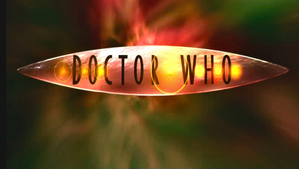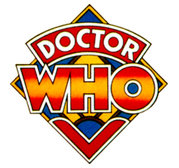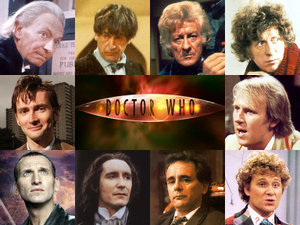It is common to see the show's title abbreviated as Dr. Who, even by the BBC, although purists consider this form incorrect.
The programme is a significant part of British popular culture, widely recognised for its creative storytelling and use of innovative music (originally produced by the BBC Radiophonic Workshop). It is also known for its innovative use of low-budget special effects for most of its history. Elements of the programme are extremely well known and identifiable even to non-fans. In Britain and elsewhere, the show has become a cult television favourite on a par with Star Trek and has influenced generations of British television writers, many of whom grew up watching the series. Doctor Who was ranked third in a list of the 100 Greatest British Television Programmes of the 20th century, produced by the British Film Institute in 2000 and voted on by industry professionals. In 2005, the series came first in a survey by SFX magazine of "The Greatest UK Science Fiction and Fantasy Television Series Ever".
After a long period off screen, a new series of Doctor Who started in 2005, continuing the programme from the original 1963–1989 run and the 1996 television movie. It is produced in-house by BBC Wales with some development money contributed by the Canadian Broadcasting Corporation (CBC). The 2005 series has concluded in the United Kingdom.
A special Children in Need "mini-episode" was broadcast on 18 November 2005, and the programme will return for a special on Christmas Day. This will be followed by a second series, with a second Christmas special for 2006 and a third series in 2007.
Production of the 2006 series is currently underway, starring David Tennant as the Doctor and Billie Piper as his companion Rose Tyler.
History
Doctor Who first appeared on BBC television at 5:15 p.m (GMT) on November 23, 1963. The programme was born out of discussions and plans that had been going on for a year. Head of Drama, Sydney Newman was mainly responsible for developing it, with contributions by the Head of the Script Department (later Head of Serials) Donald Wilson, staff writer C. E. 'Bunny' Webber, writer Anthony Coburn, story editor David Whitaker and initial producer Verity Lambert. The series' distinctive and haunting title theme was composed by Ron Grainer and realised by Delia Derbyshire.
The BBC drama department's Serials division produced the programme in-house for the following twenty-six seasons, on BBC One. Falling viewing figures, a decline in the public perception of the show and a less prominent transmission slot saw it suspended as an ongoing series in 1989 by Jonathan Powell, Controller of BBC One. While in-house production had ceased, the BBC was hopeful of finding an independent production company to re-launch the show. Philip Segal, a British expatriate who worked for Columbia Pictures' television arm in the United States, approached the BBC about such a venture.
Segal's negotiations eventually led to a television movie. The movie was broadcast on the Fox Network in 1996 as a co-production between Fox, Universal Pictures, the BBC, and BBC Worldwide. However, although the film was successful in the UK (with audited viewing figures of 9.1 million), it was less so in the United States and did not lead to a series. Although licensed media such as novels and audio plays provided new stories, the programme remained dormant until 2003. In September of that year, BBC Television announced the production of a new in-house series after several years of unsuccessful attempts by BBC Worldwide to find backing for a feature film version.
The new series debuted with the episode Rose on BBC One on March 26, 2005; Canada's CBC on April 5, 2005; Australia's ABC on May 21, 2005; and on Prime TV in New Zealand from July 7, 2005. It is scheduled to debut in France's France 4 channel on November 5, 2005. No première date or broadcaster has been announced for the United States. The American Sci-Fi Channel was briefly said to be interested in acquiring the US rights, but withdrew after the network previewed several episodes.
On March 30, 2005, the BBC commissioned a second series and a Christmas special. On June 15, it was announced that a third series and a second Christmas special had been commissioned.
Format
During the original 1963–1989 run, each of the weekly episodes formed part of a contained story (or "serial") consisting of several parts — usually either four to six in earlier years and three to four in later years. Three notable exceptions were the epic The Daleks' Master Plan, which aired in 12 episodes (plus a one-episode teaser entitled Mission to the Unknown, featuring none of the regular cast); the 10-episode serial The War Games; and The Trial of a Time Lord, which ran for 14 episodes (containing four stories often referred to by individual titles, and connected by framing sequences) during Season 23.
The programme was devised to be partly educational and for family viewing on the early Saturday evening schedule. The idea was to alternate stories set during important periods of human history (such as the French Revolution, the Roman Empire, or the Battle of Culloden Moor), which would educate younger audience members about history, with stories set either in the future or in outer space, which would educate them about science. This was also reflected in the make-up of the Doctor's original companions, one of whom was a science teacher and another a history teacher.
In practice, however, science fiction stories proved to be far more popular with the viewing public, and the "historicals" were dropped entirely after the first few years. While the series continued to make use of historical settings throughout its run, they were generally used as a backdrop for science fiction themed tales. The series featured only one more purely historical story during its original run, the 1982 serial Black Orchid, set in 1920s Britain. The programme also rapidly became a national institution, to the point where many renowned actors — both serious and comedic — asked for or accepted guest starring roles in various stories.
Read more at Wikipedia.org




